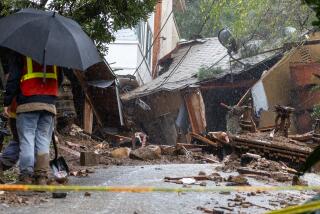THE LOS ANGELES EARTHQUAKE : Fix-It Scams Can Really Give Unwary the Jitters
- Share via
One aftershock that homeowners should be especially wary of the next few days is the wave of unscrupulous contractors and repairmen that surface after disaster strikes, consumer experts say.
They warn that so-called bunco artists are much more predictable than the earthquakes they thrive on--making easy money off upset homeowners who are looking for quick fixes.
“It’s despicable. It’s a real ripe time for fraudulent contractors to take advantage. They know people are vulnerable and desperate,” said Leticia Rico, spokeswoman for the Contractors State License Board.
Consumers Stung
She noted that during recent natural disasters, including last year’s flooding in Northern California and the Palm Springs earthquake, there was a rash of such incidents, perpetrated by unlicensed contractors, some from out of state. Consumers got stung, she noted, because they were not willing to do their own homework--investigating those they were going to do business with. The board received about 30,000 complaints last year, 10,000 of them against unlicensed contractors.
Police note that in the typical repair scheme, fraudulent contractors will go door to door in devastated areas, telling homeowners that they have just made repairs on neighboring homes and would be glad to fix their house, too. They take the homeowner’s deposit of several hundred dollars and are never seen again--until the next disaster in the next town.
Consumers should deal only with licensed contractors, who carry pocket licenses for verification. However, some unscrupulous contractors have been known to fake license documents (including fake business cards that list fake or temporary post office boxes or phone numbers). Consumers should take license numbers and cards and check with the state license board before signing contracts. The board can tell consumers whether the license is in good standing or if any legal action has been taken against the holder. There are 211,000 licensed contractors in the state.
Avoid Another Disaster
Matching up the license with the work is important. “For example, if you want floor covering done, the contractor should hold a license for that, not landscaping,” Rico said. “We are warning people not to let disaster strike twice,” said Robin Jathan, spokeswoman with the local Better Business Bureau, which also has some tips:
- If possible, get bids from three contractors. Ask contractors for references and check them. Ask to see similar jobs that were completed.
- Do not make a down payment until it is determined that the contractor is legitimate and meets appropriate licensing requirements. The most that a contractor can legally require is $2,000 or 10% of the cost of the job, whichever is less.
- Make sure the contractor has adequate liability insurance in case of an accident on the property. And ask what kind of warranty the contractor offers.
- Always obtain a detailed contract that describes all the work to be done, the materials to be used and the schedule to be followed.
- Do not sign the completion certificate until all the work called for in the contract has been completed satisfactorily.
More to Read
Inside the business of entertainment
The Wide Shot brings you news, analysis and insights on everything from streaming wars to production — and what it all means for the future.
You may occasionally receive promotional content from the Los Angeles Times.










